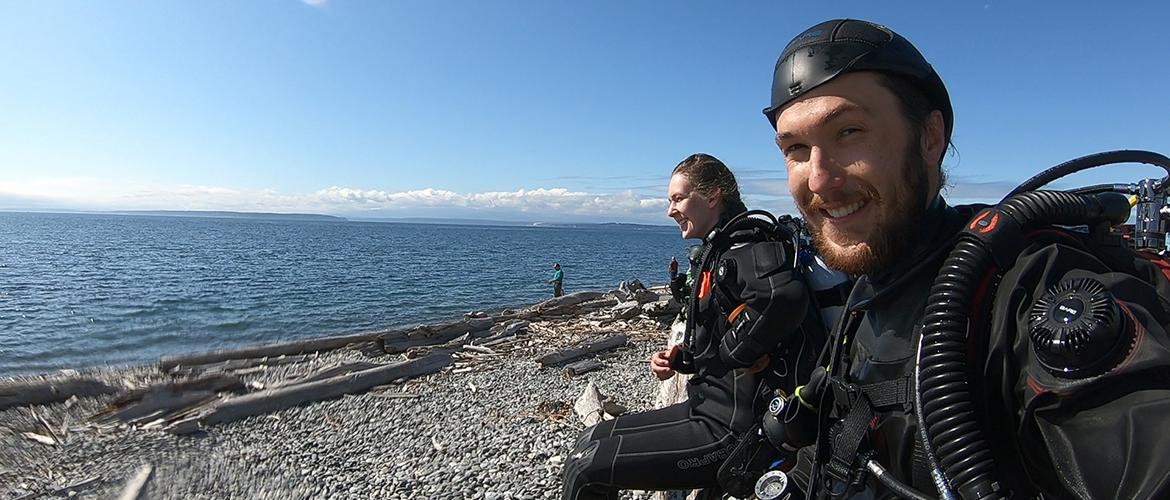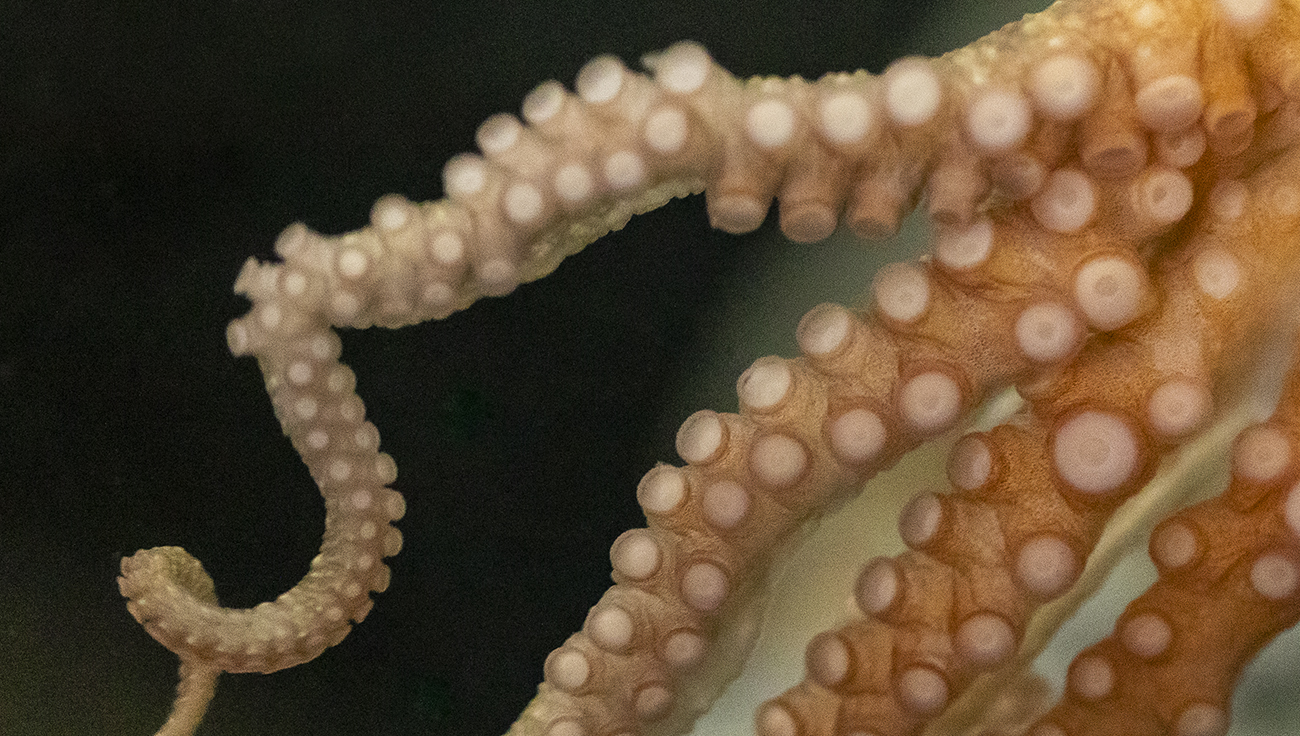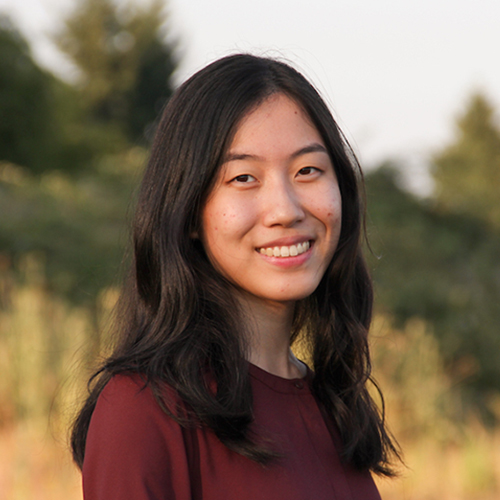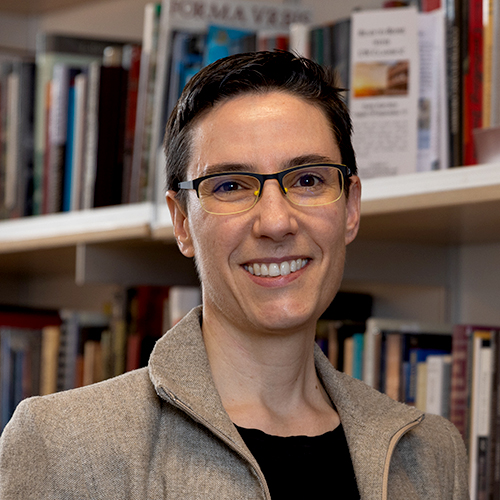
Joey Ullmann remembers the moment he fell in love. It was his second day in the lab of David Gire, assistant professor of psychology, whose lab studies Pacific red octopuses.
“It was one of those moments in my life when everything just kind of fell into place,” recalls Ullmann, a UW senior majoring in biology and psychology. “I looked around and all the things I was interested in were there.”
Ullmann has always been fascinated by marine biology. He developed an interest in psychology, particularly the neural basis of behavior, as a student at North Seattle College before transferring to the UW. Around the same time, he became an avid scuba diver. The octopus lab combines all of these interests, from studying octopus behavior to conducting research dives in the chilly waters of Puget Sound.
Interacting with these animals in their natural environment is the closest I’ll ever come to being an astronaut hanging out with aliens.
Of particular interest to Ullmann are the exceptional neural capabilities of octopuses. “Not only are they intelligent, which is pretty wild for a soft bodied invertebrate, but the unique nature of their intelligence is probably one of the most interesting aspects of their neurobiology,” he says.
Ullmann explains that octopuses do not have a highly centralized system for sorting and processing information, instead distributing much of their intelligence throughout their anatomy. Each sucker on their arms — about 200 suckers per limb — are supported by a cluster of 130,000 neurons that gather and process sensory information. That adds up to about 26 million neurons per arm. “Most of that neural capacity is for integration of signals,” Ullman says. “There’s a lot of localized computation happening. Each arm can operate autonomously, and multiple arms can be recruited to an object or task before the brain is made aware that anything is happening.”

This ability has implications for neuroengineering — imagine artificial hands gripping objects based entirely on local feedback from the fingers — which is why Ullmann, who studies psychology and biology, received a Washington Research Foundation Innovation Undergraduate Fellowship in Neuroengineering. Through the fellowship he was able to spend last summer at UW’s Friday Harbor Labs (FHL), where he studied how octopus sucker sensitivity affects arm movement based on their location on the arm. Ullmann also oversaw the health and enrichment of FHL’s 14 Pacific red octopuses, engaging them with toys and other activities to stimulate their high level of intelligence, and acclimating them to the handling required for weighing and other research needs.
Ullmann does similar work in the Gire lab on UW’s Seattle campus, where he studies the Pacific red octopus’s ability to accurately perceive its habitat during nighttime foraging. Since joining the lab in 2018, Ullmann has spent about 500 hours working with Pacific red octopuses, which weigh an average of about four ounces with arms measuring 11 to 15 inches. “I handle them in a very limited way,” he says, “because these octopuses can bite and are venomous. Working with octopuses, handling them, training them — it’s incredibly difficult but really rewarding.”
Particularly rewarding for Ullmann is the field aspect of his research. He’s working toward his certification as a scientific diver — a scuba diver trained to do field research — and has participated in more than 30 dives as a diver-in-training. Only a handful of the dives have been for octopus research, but those few have been memorable, particularly the first time he saw a giant Pacific octopus. “It was in its den so we didn’t get to see a lot of it, but I still get goosebumps thinking about it. Interacting with these animals in their natural environment is the closest I’ll ever come to being an astronaut hanging out with aliens.”
Due to their smaller size, Pacific red octopuses are more difficult to spot than the giant Pacific octopus. Like other octopuses, Pacific reds can squeeze through the smallest of openings and are brilliant at camouflage. Even when they are found, they’re incredibly difficult to track for population ecology studies. “If you tag an octopus, it will remove the tracking device from its soft anatomy,” says Ullmann. “We have a very difficult time identifying individuals in the wild, and an even more difficult time tracking individuals over long periods of time and potentially large geographic areas. For this reason, how these animals behave at the population level is not well understood. I could talk about the the complications that come with doing octopus research for a long time. But that’s what makes it fun.”
Ullmann will continue with that fun when he graduates this spring. He plans to pursue graduate studies in behavioral ecology or behavioral neuroscience, with a focus on — what else — octopuses. That’s what happens when you fall in love.
“I hope to be studying octopuses for decades,” he says. “They’re so damn cool.”
More Stories

What the Sky Teaches Us
Brittany Kamai, an astrophysicist with knowledge of Pacific Islanders' Indigenous navigation using the sky, is teaching a new UW course, Pacific Indigenous Astrophysics.

Two Majors, Complementary Skills
Elizabeth Xiong (2024), a double major in art history and computer science, shares how she gained different and complementary skills from each major.

Lifting Marginalized Voices — from Ancient Rome
"Interesting, frustrating, and necessary,” is how Sarah Levin-Richardson, professor of Classics, describes her research into the lives of enslaved individuals in the ancient world.